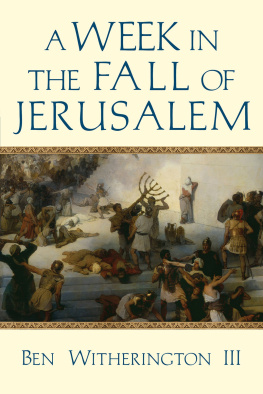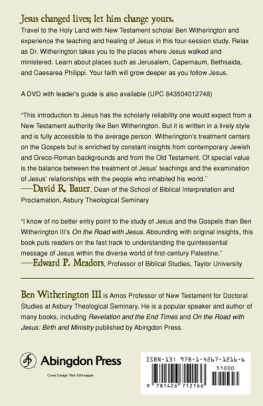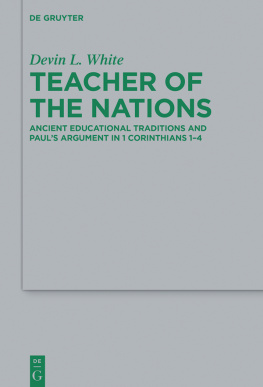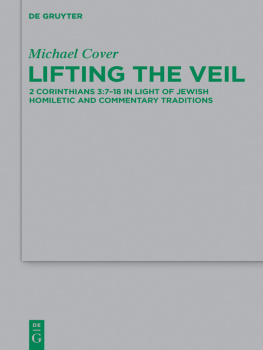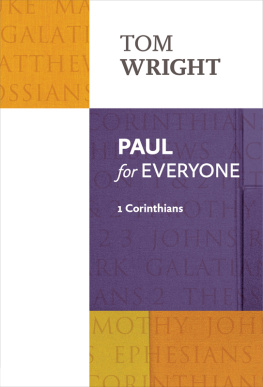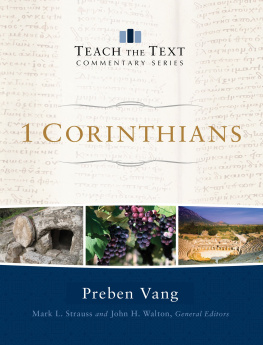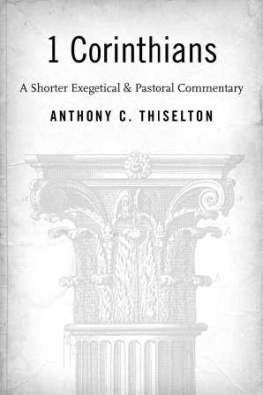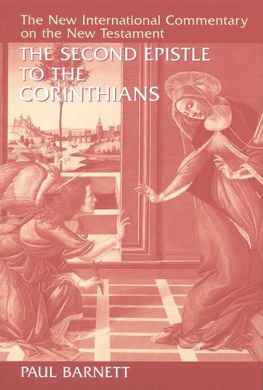CONFLICT AND COMMUNITY IN CORINTH
Conflict and
in
Community
Corinth
A Socio-Rhetorical Commentary
on 1 and 2 Corinthians
Ben Witherington III
WILLIAM B. EERDMANS PUBLISHINGCOMPANY
GRAND RAPIDS, MICHIGAN
THE PATERNOSTER PRESS
CARLISLE
1995 Wm. B. Eerdmans Publishing Co.
Published jointly 1995 in the United States by
Wm. B. Eerdmans Publishing Co.
255 Jefferson Ave. S.E., Grand Rapids, Michigan 49503
and in the U.K. by
The Paternoster Press
P. O. Box 300, Carlisle, Cumbria, CA3 0QS
All rights reserved
Printed in the United States of America
02 01 00 9 8 7 6 5 4 3
Library of Congress Cataloging-in-Publication Data
Witherington, Ben, 1951
Conflict and community in Corinth: a socio-rhetorical commentary on 1 and 2 Corinthians / Ben Witherington III.
p.cm.
Includes bibliographical references and index.
ISBN 0-8028-0144-7
1. Bible. N.T. Corinthians Commentaries. I. Title.
BS2675.3.W58 1994
227'.207 dc20
94-19491
CIP
British Library Cataloguing in Publication Data
Witherington, Ben
Conflict and Community in Corinth:
Socio-rhetorical Commentary on 1 and 2 Corinthians
I. Title
227.206
ISBN 0-85364-622-8
Quotations from Jesus the Sage: The Pilgrimage of Wisdom by Ben Witherington III are copyright 1994 by Augsburg Fortress Publishers and used by permission.
Except as noted, all photos are by the author.
Contents
Preface
Christianity is, like Islam and Judaism, a historical religion and thus not primarily a philosophical or theological construct. Specific events that took place in space and time about 6 B.C. to A.D. 100 and that involved particular people are foundational for the Christian faith, along with the words of particular people as they told of and interpreted these events. Therefore, when we examine the foundational documents of Christianity, we must take their historical character with absolute seriousness. The long-standing tendency to treat portions of the New Testament, particularly Paul's letters, as exercises in the history of ideas or as abstract collections of theological and ethical ideas divorced from their historical context and often even of their historical content does no justice to the character of these documents.
Paul was a pastor who wrote letters to address the specific problems of his converts. Many of these problems were essentially social in nature, though they had theological roots or ethical implications. Traditional commentaries on Paul's letters have too often neglected the social situations to which and out of which Paul wrote, with the result that the "theological and ethical principles" distilled from Paul for the modern Christian community are often difficult if not impossible to apply to our settings.
Of course Paul's letters cannot be reduced to nothing more than resources for understanding ancient social situations or to reflections of patterns of group behavior or problems. That would be to replace a theological or ethical reductionism with a sociological reductionism.
Interest in the sociology of early Christianity is no attempt to limit reductionistically the reality of Christianity to social dynamic; rather it should be seen as an effort to guard against a reductionism from the other extreme, a limitation of the reality of Christianity to an inner-spiritual, or objective- cognitive system. In short, sociology of early Christianity wants to put body and soul together again.
While social dynamics may create a situation, they do not determine how Paul will respond as he speaks to the situation.
One aim of this commentary on 1 and 2 Corinthians is to show how use of the social sciences has shed new light on many NT texts and has helped us to understand more fully their content and historical context. Usually "exegetes focus their work on the ideas and images, the communication and form, of the text, whereas sociologists focus on behavior and social forms of the society."
Since we have access to Paul's letters but not to their social contexts, it is natural to give primary attention to the texts themselves. Sociological analysis of Paul's communities requires reading between or behind the lines of the letters to reconstruct their social contexts.
This commentary is called a " socio-rhetorical commentary" Attention to the rhetorical dimension of Paul's letters has revealed how certain forms of argument or exhortation function in his letters, and thus how those forms ought to be interpreted. Rhetorical criticism
holds some promise for bridging biblical scholars' older, historical concerns and their newer, literary interests.... [It] is forthrightly interested in texts: defining their limits, exploring their construction and disposition, assessing their style, probing the salient issues that drive them in certain directions.... [It] attempts to understand more fully the overt and subtle relationships that exist between the form and content of texts, between those who generate and those who receive such texts. [It]...does not intend to be an ahistorical method of reading texts. Its raison d'tre stems in large measure from the fact that rhetoric was a systematic, academic discipline taught and practiced throughout the Greco- Roman world.
This commentary examines, then, both the social context and the rhetorical form of Paul's Corinthian correspondence as well as giving attention to insights from classical literature and Roman history and offering some of the usual linguistic and historical data of biblical commentaries. It thus distills the benefits of these new disciplines, placing them in the context of some older approaches, doing so for a general audience that includes college and seminary students, pastors, and lay persons. More detailed discussion for more advanced students and for scholars is confined mainly to footnotes and to sections of smaller type that come under the heading "A Closer Look."
Students of the NT in both college and seminary have repeatedly spoken to me of the desire and need for the modern Christian community to get back to the pristine character of the early ekklsia. I have always asked them "Which early community do you have in mind? Would you, for example, want your congregation to emulate the community in Corinth with all its problems as well as its promise?" I raise such questions not merely to provoke my students, but because there are better and worse ways of handling a text in order to bridge the gap between Paul's world and ours. In the concluding notes of several sections of this commentary I make suggestions regarding the relevance of various portions of these letters for the ekklsia today. These comments are deliberately intended to be tentative, not definitive.
As an exegete I take very seriously the need to understand the Bible in its original historical context. Paul addressed specific people at a specific time in a language that they could understand. What he intended that the text mean must be the starting point for all responsible uses of the text today.
But as a Christian minister I also believe that Paul's words are the Word of God and if properly handled and interpreted can still meaningfully address the ekklsia today.
Careful attention to the historical and social matrix of the Pauline communities makes it clear that the early ekklsia was far from perfect. As often as not, Paul was busy exhorting Christians to change their ways. If we believe that the Christian community of today should in some sense be biblically shaped and if we hold up the example of the Pauline communities, then we must say "go and do otherwise" at least as often as we say "go and do likewise."



